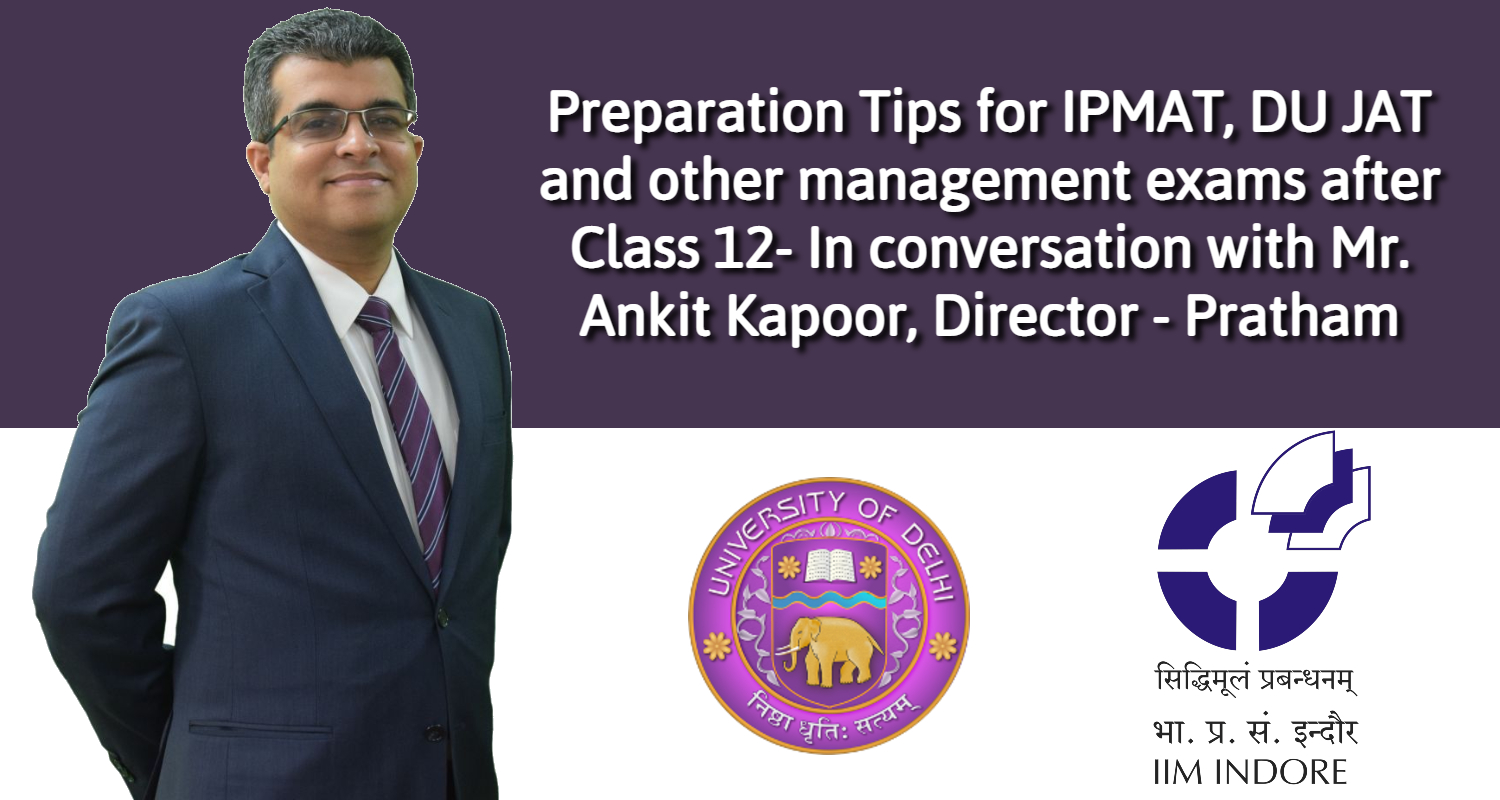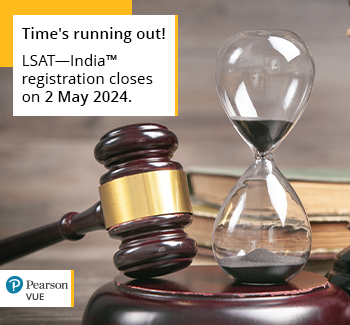Preparation Tips for IPMAT, DU JAT and other management exams after Class 12- In conversation with Mr. Ankit Kapoor, Director - PRATHAM TEST PREP

With a few months left, before important management entrance exams like IPMAT, DU JAT, and many more. Students have a lot of doubts and questions in their minds. To answer these questions, I had a talk with Mr. Ankit Kapoor, who is the Co-Founder and Director of PRATHAM Test Prep. He gave his expert opinion about preparation strategies, books along with a lot of other important things.
Here are some excerpts from this interview:
To Download IPM Past Year Question Papers, Click Here
For any Queries or Guidance regarding Entrance Exams, Colleges and more call on 9310486685
To know college based on your merit and on-call Counselling, Regular Alerts and Personalized Time Table Click here
Ojasvi: According to you, what are some of the most important management entrance that a student must prepare for?
Ankit Kapoor: There are many entrances that are there for a student to aspire for
- BMS, DUET, Delhi University
- Five Year Integrated Program IPMAT for IIM Indore, Rohtak, and Bodh Gaya
- SAT for IIM Ranchi
- NPAT, Narsee Monjee Institute of Management, Mumbai
- SET Exam, Symbiosis, Pune
- BMS, St. Xaviers, Mumbai
- BBA, Guru Gobind Singh Indraprastha University
- BBA, Jamia University
- BBA, Christ University
Ojasvi: Every year, there are a lot of students who aim to crack management entrance tests. Due to the pandemic, they are all preparing online. What would an appropriate preparation strategy to get the best results?
Ankit Kapoor: The Pandemic has given us a lot of time to identify our learning style. The Online methodology provides a student with self-paced learning.
A student first should understand the exam he/she is targeting. Almost all the entrances test you on General Awareness, Quantitative Ability, Verbal Ability, and Logical Reasoning.
The perfect strategy is to be regular in completing the concepts related to the topics and then practice. A wise student should take as many Mock tests as possible and analyze them in order to have a clear idea about the areas that require attention.
Current affairs are increasingly getting check across entrances and even beyond like in the interview rounds, so a student should be up to date with what’s happening in the world around them also.
Ojasvi: The IPMAT paper has a negative marking scheme for MCQs which makes students choose their answers carefully. In your opinion, what would be the best approach towards MCQs so that they don’t lose marks?
Ankit Kapoor: The IPMAT exam is divided into three sections
- Quantitative Ability: MCQs
- Quantitative Ability: Subjective Section (Short Answer type)
- Verbal Ability
There is a sectional cut-off in this exam and a student has to clear all Sections Cut off individually to be able to move ahead.
Please note that the Quantitative Subjective Section does not carry any negative marks.
A student should try to gauge the difficulty level of the exam by spending some time looking at the type of questions asked in the section. A student should answer those questions that are from topics of their comfort zone and then should try those where they have some doubt. If a child cannot understand what is expected to be solved in a question in the first 10 seconds of reading the Questions, he/she should leave the Question and move on and come back to it when time permits.
Also, A student should understand that an entrance exam is not expecting you to do all the questions, instead, it seeks smart work and checks your articulate thinking. If we were to look at the section cut-offs of IPM Indore 2020, we would understand that the paper is difficult and we don't have to solve the full paper to Qualify
QA SA – 20 out of 40 Tentative Cut Off
QA MCQ – 26 out of 80 Tentative Cut Off
VA MCQ – 68 out of 80 Tentative Cut Off
Ojasvi: Students who prepare for DU JAT are always advised to go through the previous year's papers. According to you, why is it important to solve the previous year's question papers and how do they benefit the student?
Ankit Kapoor: The previous year's paper provides enough practice to the students. They also help the student to understand the level of questions asked in the entrance exam. It is been noticed that some questions are asked in repeat mode. It also helps student gauge their preparation with an actual paper, after giving the paper, students exactly know what areas to work upon and topics to be prioritized.
Time Management, a thing that is a concern point for many, also gets better if you take this previous year's exam papers. A proper analysis of them helps you understand your preparedness and areas of improvement.
Ojasvi: In 2020, the IPMAT Examination Pattern saw significant changes. The number of questions, sectional time limit, test duration, and maximum marks was reduced. How do these affect students attempting the paper?
Ankit Kapoor: The pattern saw a change due to the pandemic. The entrance was canceled and rescheduled many times. In lieu of this, the authorities decided to change the pattern of the exam and its duration. The significant change was in the strategy of taking the entrance exam. The students had to modify their time management. The contents of the exam were not changed. Only the number of questions was reduced. In 2021 we are expecting the IPM exam body to go back to the 2019 pattern which was
20 Questions of Quantitative ability Subjective Section (Short answer type) to be done in 40 mins
40 Questions of Quantitative Ability MCQs to be done in 40 mins
40 Question of Verbal Ability MCQs + Short answer type to be done in 40 mins
Ojasvi: The English vocabulary and comprehension section is very important for St. Xavier’s BMS Entrance Test. What advice would you give to students that would help them develop these skills?
Ankit Kapoor: The entrance exam of BMS, St Xaviers tests you on various aspects of Verbal Ability. Vocabulary and Comprehension are the most important ones
For Vocabulary: A student should regularly learn at least 10 words/day. The focus should be on the usage of the word. Different techniques should be taken into consideration like Etymology, Mnemonics, etc. Also, attend PRATHAM Test Prep Youtube channel where we do live sessions on vocabulary to build a base of words.
For Comprehension: Regular reading of a variety of texts is very important. A student should also focus more on solving passages on a daily basis that give them a lot of practice.
Ojasvi: The DU JAT syllabus is based on the NCERT Class XII syllabus as prescribed by CBSE. However, the Business and General Awareness (GK) is really vast and extensive. What kind of books would you suggest for Business and GK Section Preparations as well as for other sections?
Ankit Kapoor: General Awareness is the make or breaks section. There is no prescribed syllabus for this section. A student should regularly read the newspaper and also refer to the comprehensive material of PRATHAM TEST PREP to prepare this section.
For Business Awareness, few topics are seen as frequently asked.
- Brands and Punch lines
- Brand Ambassador and business terms
- Chairman/Chairpersons & CEO of Indian and International companies
- Mergers and acquisitions that have happened in the last one year
- Any other important Business related news.
- News related to the Budget is also very important
For Static GK
- History
- Geography
- Science
- Polity
- Economics
For Current Affairs for DU JAT 2021, Students are expected to read newspapers from June 2020- July 2021. Anything that has happened in this duration can be asked as a Question, so keeping yourself up to date is critical.
About Author

Ojasvi Gupta
Ojasvi Gupta has worked for the Indian Express and Enactus DSC as a writer. Currently pursuing BCom Hons from Delhi University, she loves to spend her free time listening to music, reading, or playing with her dog. With her strong inclination towards writing, she serves as an author for Educere India.







